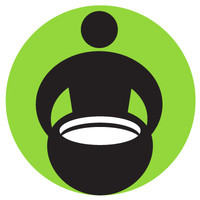
This is part of a series on "The Future of Fair Trade," written in collaboration with Fair Trade USA. A 501 (c) (3) nonprofit organization, Fair Trade USA is the leading third-party certifier of Fair Trade products in the United States. To follow along with the rest of the series, click here.
By Amy Carniol
It's Valentine's Day, and in supermarkets, drug stores and specialty shops across the country, shelves are lined with chocolates of every shape, size and variety. As you browse through endless heart-shaped boxes, consider this: The chocolate industry is in jeopardy, and if things don't change, there could be a worldwide cocoa deficit by the year 2020.
In a chocolate-obsessed society, it's hard to fathom ever running out of the sweet treat. How is it even possible that a staple crop like cocoa can be nearing depletion? The answer is surprisingly simple: It's just not profitable to be a cocoa farmer. According to Oxfam, less than 5 percent of the price of a typical chocolate bar goes back to the cocoa farmers; for many, this translates to an income of only a few dollars a day.
Cocoa farming is an extremely labor-intensive process, and a whopping 90 percent of the worldwide cocoa supply comes from small, family-run farms in West Africa, Latin America and Southeast Asia. Fragmented and isolated, the 5.6 million cocoa farmers around the world have little to no bargaining power. Most are forced to accept whatever price they're offered for their crops, regardless of whether they earn a profit or take a loss.
With such an inequitable market structure, more and more members of the next generation of potential farmers are opting to move to larger cities with better job opportunities. In the Ivory Coast, for example, the average age of a cocoa farmer is roughly 55. Both the farmers and the trees are aging, and with little ability to invest in the future, the industry faces serious challenges. Add to that an increased worldwide demand for the crop, coupled with low productivity, and the future seems even bleaker.
But chocoholics needn't stockpile their Valentine's candy just yet. We can be part of the solution by looking for products that help farmers earn a better income, improve their lives and protect the environment. Just look for the Fair Trade Certified label. Try brands like Guittard, Ripple, Chocolove, Alter Eco and Sunspire for a start.
Through its certification program, Fair Trade USA, the leading third-party certifier of fair trade products in North America, ensures that both the farmers and the land involved in making a product are treated with dignity and respect. Fair Trade farmers are paid a premium for their crops, and investing in the farmers means investing in the future.
“We use the Fair Trade premium to help improve the quality of our cocoa and the amount of production,” says Washington Rodriguez Ortiz, a cocoa farmer with the ACOPAGRO cooperative in Peru.
In exchange for this premium, Fair Trade-compliant farms must adhere to a lengthy list of requirements, from eco-friendly farming to supply chain transparency. Child labor is also strictly prohibited. As a result, Fair Trade farmers can gain access to important amenities like healthcare, education and clean water--all of which are standards in the developed world but luxuries to rural cocoa farmers. Fair Trade farmers also receive better information about market trends and quality demands, and, in general, they have a closer connection to end buyers and consumers.
"Before I was a member of Kuapa Kokoo [cooperative], I was facing many problems," explains Mary Nyamekye, a cocoa farmer in Ghana. "I had no money to feed my family or educate my children. I have been relieved of my problems…I was formerly a member of another cocoa-buying company, but I never had a voice. Now I can speak my views and people listen."
On the flip side, Fair Trade USA also aids brands of all sizes looking to convert their supply chains. For example, with the organization's help, Hershey's has already purchased Fair Trade and aims to achieve 100 percent certified cocoa by the year 2020.
“With the impending cocoa deficit, there is now not only a moral, but also a financial imperative for chocolate companies to help their farmers earn a better wage,” said Elan Emanuel, cocoa supply chain manager at Fair Trade USA. "Commitments from companies like Hershey’s go a long way toward ensuring that cocoa farmers have sufficient resources to feed their families, and ultimately, to continue providing cocoa for the world’s consumers.”
Part of Fair Trade USA’s work includes helping more farmers earn certification, and to help existing farmers increase the benefits they see from Fair Trade. In 2013 alone, the nonprofit trained and enrolled eight new cooperatives representing 2,500 small-scale cocoa farmers in the Ivory Coast, as well as 1,500 small farmers in the Dominican Republic.
So maybe it's time to think twice about the cocoa we buy. This Valentine's Day – and everyday – make the right choice before you head to the checkout counter. Fair Trade certification is much more than just logo crowding a candy bar wrapper; it's an investment in the future of the chocolate industry.

Fair Trade USA is a nonprofit organization that is the leading third-party certifier of Fair Trade products in the United States. Fair Trade USA audits and certifies transactions between U.S. companies and their international suppliers to guarantee that the farmers and workers producing Fair Trade Certified goods were paid fair prices and wages, work in safe conditions, protect the environment, and receive community development funds to empower and uplift their communities.














